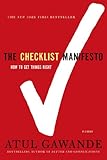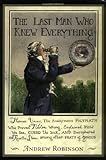First off, I believe in checklists, so why am I reading?
Do I want to either confirm my understanding or increase my vocabulary to discuss the subject? I had to answer that before really starting into Checklist Manifesto.
This question started after I read the introduction to 7 Habits of Highly Effective People. Covey explains his desire for the reader to proceed with the intention of explaining and teaching. To not simply agree or move beyond the concepts; instead absorb them to explain to someone else.
This simple technique has made a profound difference in how I read books. Especially if I think I may know the subject well. Checklist Manifesto widened my vocabulary. It bettered my ability to discuss and share why I think checklists are important. Primarily, it helped me to explore the very confusing encounters with people who resist checklists as if their soul depended on it.
Why is there resistance to checklists?
I’ve seen two reasons for resistance so far. One is quite innocent and grows from a flaw I possess. Disorganization! Checklists help but someone has to call the shots. Without someone, or something, to initiate the process it won’t get done. My morning has a checklist to it, but I still often times forget. This is ineptitude on my part. That ineptitude can create resistance. I do not want to fail so I kill the checklist.
The second reason is discussed by Dr. Atul Gawande through the book. These are the non-believers. The best reward of reading Checklist Manifesto was opening my mind, to seek and gain understanding about why people resist implementing checklists.
Before we can answer that, though, we have to talk about why checklists are important. Checklists are important because we fail. We make mistakes.
Two reasons we may fail: Ignorance or Ineptitude
Dr. Gawande very frankly describes how he sees mistakes. The root cause exists between Ignorance or Ineptitude. Ignorance is forgivable, mistakes caused from lack of knowledge. We cannot be expected to do better when we don’t know better. Ineptitude, however, is a different matter. With ineptitude, the knowledge exists and we know it, yet we fail to apply it correctly.
Checklists are designed to ensure ineptitude has limited impact. Ineptitude is not a permanent attribute, it is a momentary state. It can occur for a multitude of reasons, most importantly for very human reasons. The distractions, beliefs and stresses in the modern life could almost excuse ineptitude, except for the very real consequences of those mistakes.
When it’s life or death, or just life.
When mistakes happen, we remember some of these and react. Whether a surgeon loses a patient through mistakes and moments of ineptitude, or a plane goes down and hundreds of people die, there is a reaction to figure out what went wrong.
With airlines, checklists have emerged from the ashes and are now first-class features. These checklists have not stifled innovation. All evidence points to success. Sometimes the checklists are extremely terse, only a few items just to remember the really critical steps that are disastrous if overlooked.
Most importantly, checklists have evolved because we needed them. Because the world got too complicated.
The Master-Builder model is dead
We’ve complicated life and at the same time pretend it’s simple. We resist acknowledging our own limitations. We do this despite our failures to remember critical details. I believe we simply need to embrace the fact that the era of Thomas Young) and Joseph Leidy, people who were once labeled to “know everything” is over. We can’t even know how our cellphone turns on or the stitching is in our clothing. I didn’t know how a sewing machine worked. It’s still magic.

This is not a bad thing. Quite the opposite, even. This is a sign of progress. It’s time to embrace it, and in doing so, embrace the checklist and the very real need for collaboration. We can’t be expected to know everything. We have our areas of specialty, and others have theirs. We team up. We work together. We put men on the moon.
Dr. Gawande explores how checklists empower people and create a cohesive team.
Teamwork, Discipline and Leadership
If success is determined by a team that runs fluidly, has leadership but is free of condescension (something rare in operating rooms, it seems), then how can a checklist help?
It sounds very simple. The first item Dr. Gawande tackles on his Operating Room checklist is ensuring everybody introduces themselves and declares their roles. There is a lot of powerful psychology here. When someone states their roles verbally, they’re setting a precedent to continue speaking. Also, the listeners set a precedent to continue listening.
Just ticking boxes is not the ultimate goal here. Embracing a culture of teamwork and discipline is.
Something as trivial as formal introductions had huge impacts in how teams operated. However, without the checklist item, these introductions were quick to be forgotten. We cannot remember all the things all the time, nor learn all the things. Even when it’s as simple as introducing ourselves.
Checklists are not a crutch, they are maps with the dangers highlighted. We must embrace our limitations both in knowledge and discipline.
Discipline is uniquely human
No other creature on earth is able to be introspective. Humans are willing and able to contemplate existence, our failings and strengths and devise innovative ways to improve ourselves. More importantly, humanity is adept at creating reusable ways to improve others. Just as the Pilot’s Checklist moved into the Operating Room, it can move into any other industry.
Another inherent attribute is our adaptability. This is a prized trait, and many people in leadership roles or in any position of power would describe themselves as versatile, adaptable or innovative.
It stands to reason that the mention of a checklist goes counter to those attributes. Except we must look deeper at what the checklist is. The checklist is not about ticking boxes. It’s about being disciplined when success is at stake and putting our best efforts into our activities.
I can think of no worse failure than a failure caused by a critical, but easily forgotten step.
Resistance revisited
Why do we resist something as beneficial as a checklist? This question occurs throughout the book, and in the end is directly addressed but not answered.
I can speculate as to why, and in discussing the checklist and listening to reactions I believe I’m close to an answer. It’s not the right answer, but it’s a step in the right direction.
The immediate perception of a checklist is competitive.
It’s saying, “The checklist is better than you!”
It’s saying, “The checklist won’t forget, but you will!”
It’s saying, “The checklist can do your job, and you can’t.”
None of these are true, but that first impression prevails.

